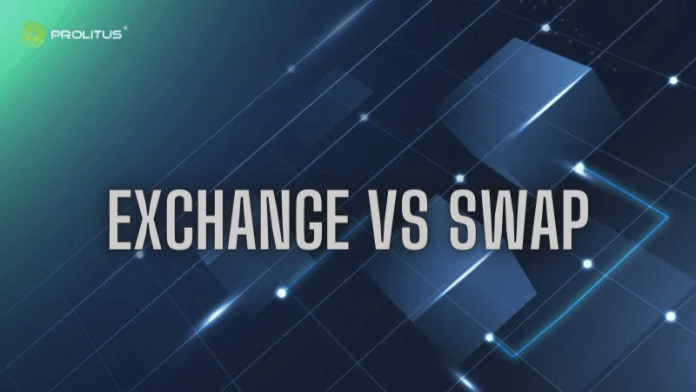Cryptocurrency trading has become an increasingly popular way for people to invest their money in recent years. However, as the market grows, so do concerns around security. Two of the most common methods of trading cryptocurrencies are exchanges and swaps. In this article, we will explore how these two methods work and compare their security features.
Understanding Cryptocurrency Exchanges: How do they work, and what are the risks involved?
Cryptocurrency exchanges are online platforms that allow users to buy and sell cryptocurrencies using different types of fiat currencies or other cryptocurrencies. In a typical exchange transaction, the user deposits funds into their account and then uses those funds to buy or sell cryptocurrencies at the current market price. The exchange will take a fee for each transaction.
The main risk associated with cryptocurrency exchanges is the possibility of a security breach. Hackers can target exchanges to steal user funds or other sensitive information. Additionally, exchanges can be vulnerable to insider attacks or regulatory scrutiny, which can lead to asset freezes or account closures.
Understanding Cryptocurrency Swaps: How do they work, and what are the risks involved?
Cryptocurrency swaps, on the other hand, are peer-to-peer transactions that allow users to trade one cryptocurrency for another without the need for an intermediary like an exchange. Swaps are typically facilitated through decentralized exchanges or automated market makers.
In a cryptocurrency swap, the buyer and seller agree on a price for the exchange of their respective cryptocurrencies. The transaction is executed through a smart contract that ensures both parties receive their agreed-upon assets.
The main risk associated with cryptocurrency swaps is the potential for the smart contract to malfunction or be vulnerable to exploitation. Additionally, because swaps are typically conducted on decentralized platforms, there is no central authority to oversee transactions or provide customer support in the event of a dispute.
Security Measures in Cryptocurrency Exchanges: What are the measures taken by exchanges to ensure the safety of user funds?
Cryptocurrency exchanges have implemented several security measures to protect user funds, including:
- Two-factor authentication (2FA) to prevent unauthorized access to user accounts.
- Cold storage for the majority of user funds, meaning that the funds are stored offline in secure locations, rather than online where they could be hacked.
- Regular security audits and penetration testing to identify vulnerabilities and improve security.
- Compliance with regulatory requirements, such as anti-money laundering (AML) and know-your-customer (KYC) regulations.
Security Measures in Cryptocurrency Swaps: What are the measures taken by swaps to ensure the safety of user funds?
Cryptocurrency swaps typically rely on smart contracts to execute transactions. These contracts are designed to be immutable and secure, with measures in place to prevent tampering. However, there are some risks associated with using smart contracts for swaps, including:
- Smart contract vulnerabilities that could be exploited by hackers.
- Disputes that arise from errors or inaccuracies in the smart contract code.
Advantages of Cryptocurrency Exchanges: What are the benefits of using exchanges for crypto trading?
There are several advantages to using cryptocurrency exchanges for trading, including:
- Greater liquidity, meaning that users can buy and sell cryptocurrencies quickly and easily.
- Access to a wide variety of cryptocurrencies and trading pairs.
- Professional customer support and regulatory compliance.
Advantages of Cryptocurrency Swaps: What are the benefits of using swaps for crypto trading?
Cryptocurrency swaps also offer several advantages for trading, including:
- Lower fees compared to exchanges.
- Greater privacy, as users do not need to provide personal information or identification.
- No need to deposit funds into an exchange wallet, reducing the risk of exchange hacks.
Disadvantages of Cryptocurrency Exchanges: What are the drawbacks of using exchanges for crypto trading?
There are also several disadvantages to using cryptocurrency exchanges for trading, including:
- High fees for some exchanges,
- The potential for exchange hacks, which can result in the loss of user funds.
- Lengthy withdrawal times, which can be frustrating for users who want to access their funds quickly.
- The need to provide personal information and identification for regulatory compliance.
Disadvantages of Cryptocurrency Swaps: What are the drawbacks of using swaps for crypto trading?
Cryptocurrency swaps also have some disadvantages, including:
- The potential for smart contract vulnerabilities or errors, which can result in the loss of user funds.
- Lack of liquidity compared to exchanges, which can make it difficult to find a suitable trading partner.
- No regulatory oversight, which can leave users vulnerable to fraud or scams.
Which one is better for security: Exchange or Swap? A detailed comparison of the security features of exchanges and swaps
When it comes to security, both cryptocurrency exchanges and swaps have their strengths and weaknesses. Exchanges typically offer greater security measures, such as cold storage and regulatory compliance, but are also more vulnerable to hacks and insider attacks. Swaps, on the other hand, rely on smart contracts for security, which can be vulnerable to exploitation or errors.
Ultimately, the choice between using a cryptocurrency exchange or swap for trading depends on an individual’s security needs and preferences. Users who prioritize security and regulatory compliance may prefer to use an exchange, while those who value privacy and lower fees may prefer to use a swap.
Conclusion: Which one should you choose for crypto trading, exchange or swap, based on your security needs?
In conclusion, both cryptocurrency exchanges and swaps offer their own unique advantages and disadvantages for trading. Exchanges typically offer greater security measures and regulatory compliance, but can also be more vulnerable to hacks and insider attacks. Swaps, on the other hand, offer greater privacy and lower fees, but may also be more vulnerable to smart contract vulnerabilities or errors.
Ultimately, users should weigh the pros and cons of each method and choose the one that best suits their security needs and trading preferences. By understanding the risks and benefits of each method, users can make informed decisions about how to safely and securely invest in the cryptocurrency market.
